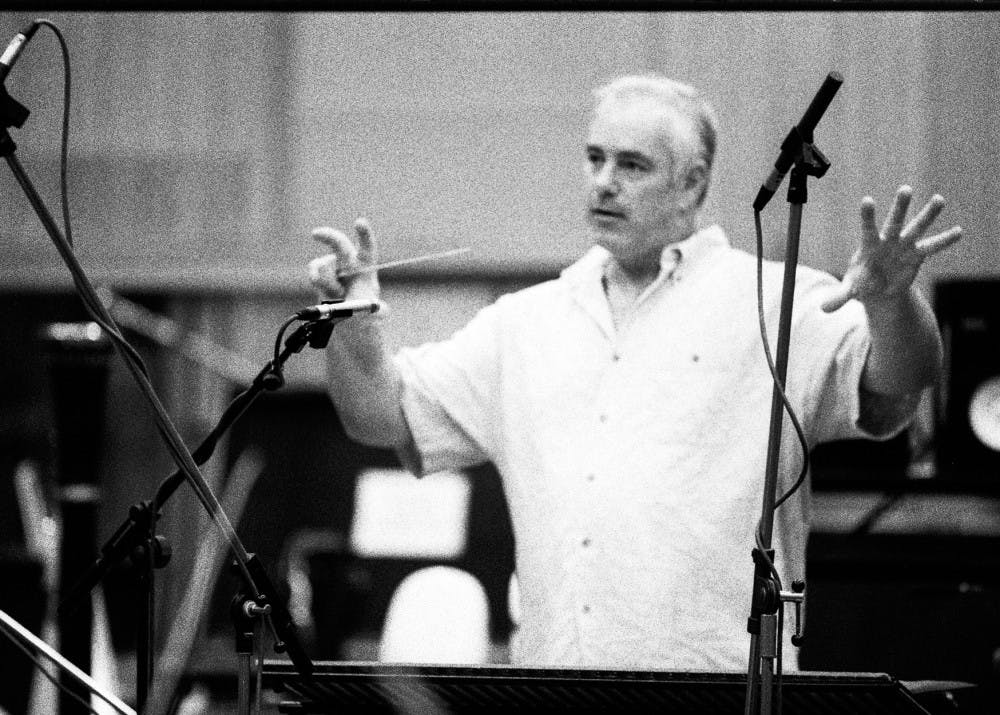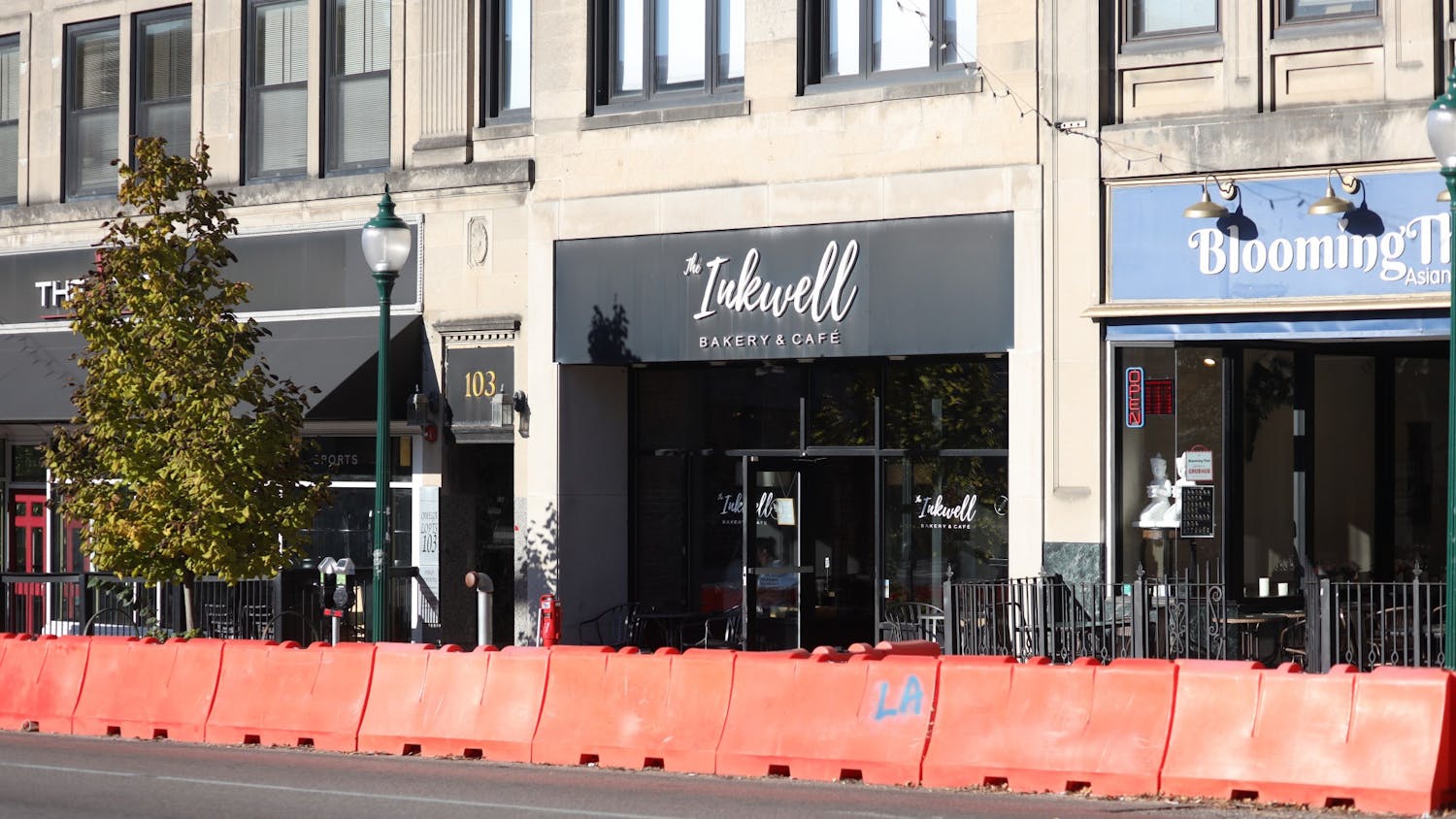Emmy Award-winning composer Larry Groupé began teaching at The Jacobs School of Music this past year, bringing a new program in composing for visual media to the school. In a Q&A with Indiana Daily Student, Groupé shares his insight on creating and teaching these new classes at Indiana University.
Indiana Daily Student: Why did you decide to teach at Jacobs School of Music?
Groupé: The quick and short answer is, it’s an extremely high-end, exceptional school—one of the top three music schools in the country, in my opinion, so I find it very prestigious.
Also, I’ve been here a couple times doing a special masterclass series, and I really liked the people that I met and the campus, so I had some level of familiarity with it. I also teach a film scoring summer workshop, which five Jacobs students have gone through over the last couple of years.
So all of that kind of led to the situation where Jacobs wanted to finally bring up to speed and offer film and media scoring here because it didn’t. Since they saw me in some of my other presentations that I came here for and students who took my workshop really raved about it, they did a nation-wide search for the position.
IDS: Have you had a full-time teaching position before?
Groupé: No. The first one. I’ve been out in Southern California and the industry for 27 years. I have taught at universities and conservatories where they bring me in for a semester, so it's like a special one-off. As I mentioned, I have this special summer workshop program which is going on extremely well, so I’ve got some, you’d say, street cred. as a teacher, and I’ve just enjoyed it.
IDS: Has it been challenging to adjust to creating a new curriculum for your classes?
Groupé: Yes. One of the reasons why I wanted the job is I’m designing everything from scratch. So I’m not like, for example, going into a school that already offered this and replacing somebody. So no, this is completely from the ground up, and I found that very attractive.
IDS: Can you talk about what the program is?
Groupé: The media school is really glad to have me here because I’m also teaching the art of film scoring to filmmakers in the media school. Which helps them a lot because they don’t really think that much about music and how best to use it, so it’s expanding their skills as directors or editors or whatever it is they’re trying to do in their life.
They don’t have to be the composer necessarily or even a musician but understand how the music operates. Then I give them various scenes and have them go find music and cut them into the scene.
So they go through all the same kind of decisions that a composer would. So there’s that on the media school side. Again, on the Jacobs side, I hand out scenes to those musicians, but they are composers so they’re actually writing original music to the assignments I give them.
That culminates with a big recording session at the end of the semester, so they go through a Hollywood style recording experience.
IDS: How do you challenge your students?
Groupé: I usually pick the scenes because I have certain challenges in each one that I want them to address. Eventually as we get about halfway through the semester, I put together three or four in a folder and tell them they can pick whichever they’re attracted to, so they do get to do that eventually.
What I’m really teaching is the dramatic choices that we make. The Jacobs composers, they’re not really used to doing this because they’re writing for concert stage, their academic works and that’s great, but when you’re working with a collaborative art form like with a film director, editor, or producer, everybody has to get together and decide what’s the best way forward.
Assuming that they have the skills to write music, which of course the Jacobs composers do, which is not necessarily about that. What it is about is the emotional content of what they just wrote. It’s seeing story arc and character development and so on. That is where the challenge really comes in. That’s how I’m grading them, on dramatic choice.
IDS: What are you hoping to bring in the new year?
Groupé: My primary course that I teach here is under the umbrella of topics in scoring visual media. That’s actually the title of everything I’m doing here. Within that, I’ve now made one semester—what we just finished.
I call it short-form. The semester coming up is called long-form. The difference between them, is that in short form, the scenes that we do are often taken from certain films, but more importantly I also put in short-subject films, you know films that are maybe 6 to 8 minutes long, as opposed to a full-length feature film.
Also short-form covers other aspects of the business such as loop, writing gaming loops for video games, commercials, you know just an old classic 60-second commercial. So all kinds of things that are basically short in nature.
The dramatic challenges are still there so you still go through all the things you have to do to put together the right concept but do it with a variety of short-form choices. The contrast with what is about to happen in January on long-form is that it will be entirely feature-length films.
So we will be studying the film deeply, coming up with a good, once again, emotional and dramatic plan. Then we will start writing a variety of scenes within the film. Now you’re going to start to learn how to develop your scene and how they are going to recur on certain characters and so on.
The challenges are the same in both courses, it’s just how we get there is short and then long.
IDS: What films are you using in class?
Groupé: These are films that I have worked on, so I happen to have a special work print that the composer would use. So there’s no other music in there, the dialogue has been separated, we kind of need the film in that format.
So the titles that we’ll use, which again are feature films that I have already written are, "The Contender", "Resurrecting the Champ", "Straw Dogs", and that’s what I have prepared so far. "The Contender" was a big Gary Oldman, Jeff Bridges, Joan Allen film and won two Academy Awards.
"Resurrecting the Champ" stars Samuel L. Jackson and "Straw Dogs" is Kate Bosworth and James Marsden. The fourth film, is called "Nothing but the Truth", and stars Kate Beckinsale and Matt Dillon.
IDS: How has the experience of teaching at Jacobs changed the way you’ve seen your own craft?
Groupé: I would say probably the most important new chapter for me that way is going to all the absolutely incredible recitals and concerts that are going on.
This has been an opportunity for me to get back into going, and listening to all kinds of different music, in and of itself is very inspiring. Jacobs, of course, is a horn of plenty when it comes to all kinds of performances and different music experiences.




